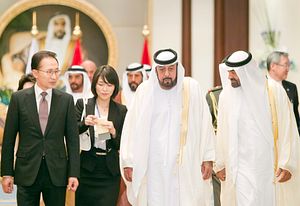In Sweihan, a small town in Abu Dhabi, a South Korean special forces team operates under the name Akh, which means “brother” in Arabic. The Akh Unit operates under the slogan: “The world’s best special forces warriors, accomplishing missions together!”
Since the unit’s initial deployment in January 2011, about 1,600 South Korean soldiers have been dispatched to train the United Arab Emirates’ special forces and to conduct joint exercises and engage in exchanges with the UAE military. But in recent months its existence and activities have come under scrutiny in South Korea, as has the nuclear deal that apparently led to the elite unit’s presence in the UAE.
The Akh Unit came under the spotlight as part of an ongoing special investigation by the South Korean prosecutor’s office under the incumbent President Moon Jae-in on the allegations against former President Lee Myung-bak, who negotiated and sealed the ROK-UAE nuclear power plant deal. Lee’s former minister of defense recently admitted that an undisclosed military pact between South Korea and the UAE was signed to seal the nuclear power plant deal. The pact included a controversial clause that would obligate South Korea to intervene militarily to protect the UAE in the event of a crisis, in addition to the deployment of South Korean special forces – meaning the Akh Unit and possibly additional units – and the supply of military equipment on an ongoing basis.
Apparently, the existence of such a pact played an instrumental role in South Korea’s success in winning the bid to build a nuclear plant for the UAE in 2009. Specific details of the pact surfaced when the current South Korean administration of President Moon Jae-in embarked on an attempt to redefine the relationship with the UAE, and the UAE responded by applying pressure to South Korean construction conglomerates SK and GS.
Almost a decade after the signing of the ROK-UAE agreement to build the UAE’s first nuclear power plant near Abu Dhabi, the first two units of the planned four 1,400-megawatt reactors are near completion. In September 2017, UAE energy minister Suhail Al Mazroui was quoted as saying that the UAE’s first nuclear power plant would be operational in 2018.
Military exchanges or deployments are not new to South Korea. However, of all the South Korean military units operating overseas – the Hanbit Unit in South Sudan, the Dongmyung Unit in Lebanon, the naval Cheonghae Unit stationed off the coast of Oman, and the Akh Unit in the UAE – only the Akh Unit has been granted the authority to conduct standalone missions and to engage in combat apart from carrying out peacekeeping operations.
The crux of the matter is a controversial clause in the ROK-UAE military pact that does not require approval from the South Korean National Assembly to engage in conflict, should there be a request for military assistance from the UAE. Such a level of military engagement has existed only under the U.S.-ROK alliance.
As far as South Korea’s domestic politics are concerned, deploying South Korean military forces to actively engage in conflict in the Middle East would almost be unimaginable without the existence of this secret pact. Convincing the National Assembly to authorize such a deployment would be a painstaking process that would require significant political capital of the president and ruling party. The pact, however, bypassed National Assembly approval and circumvented the legislature’s authority.
The decision to enter into such a pact shows the risks the Lee government was willing to take to secure the UAE’s nuclear deal, which was probably seen as a “gate opener” for future South Korean nuclear exports to the region.
It is telling that the former South Korean government was willing to deploy national security resources in support of a business deal without informing the public or the National Assembly, while risking military entanglement in an increasingly insecure region. It is not unheard of for nuclear technology suppliers to help with securing sensitive nuclear facilities in recipient countries like the UAE, but one wonders whether the South Korean government at the time had considered all the possible implications of such involvement in a volatile region. Lee Myung-bak’s denial that he knew about the hidden military pact adds to the questions about why and how such a decision was made, and who has benefited from it.
It is worth noting that the ROK-UAE nuclear deal also has been criticized in South Korea for being commercially weak. The bid was reported to be about 20 percent beneath the industry average bidding price range. Other unsuccessful bidders from France, Japan and the United States may now feel a bit better about losing out to KEPCO, knowing that there was more behind the deal than a mere cost discount.
And despite all the risks the former South Korean government was willing to take to seal the UAE nuclear deal, it’s not clear how much the contract will benefit South Korean as it seeks future nuclear deals. So far, South Korea has not managed to replicate its success in the UAE in other countries in the region or elsewhere – despite talk of being the preferred vendor for Saudi Arabia’s plan to build its first nuclear power plant. Going forward, South Korea’s nuclear export policy will likely also be under increased scrutiny because of the current administration’s anti-nuclear leanings.
South Korea will also face fierce competition from other strong contenders in the bidding races for nuclear power plant construction in the largely untapped Middle East region, including from China, Japan, the United States, Russia, France, and the United Kingdom.
Under the circumstances, future nuclear power generation deals between South Korea and the Gulf States may not unfold smoothly.
June Park is Research Fellow on Northeast Asia at Seoul National University Asia Center. Ali Ahmad is Director, Energy Policy and Security Program at the American University of Beirut
































